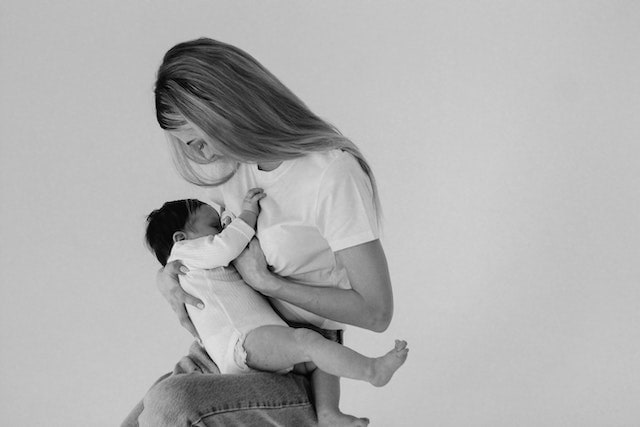Breastfeeding is a crucial time for both mother and baby, as it provides essential nutrients and antibodies for the baby’s growth and development. However, breastfeeding mothers need to be cautious about what they eat, as certain foods can cause food poisoning.
Breastfeeding food poisoning can be dangerous for both the mother and baby, and it is important to understand the causes, symptoms, and treatment options to prevent any complications.
Food poisoning occurs when a person ingests contaminated food or water, which can lead to symptoms such as nausea, vomiting, diarrhea, and stomach cramps.
Breastfeeding mothers can experience similar symptoms if they consume contaminated food, and it can also affect the quality of breast milk.
Some common causes of food poisoning include bacteria, viruses, and parasites, which can be found in raw or undercooked meat, eggs, dairy products, and seafood.
Breastfeeding mothers need to be aware of the risks of food poisoning and take necessary precautions to avoid it.
Identifying and avoiding risky foods, practicing good hygiene, and staying hydrated are some ways to prevent food poisoning. In case of any symptoms, it is important to seek medical attention to prevent any complications.
Understanding Breastfeeding and Food Poisoning
Breastfeeding is the act of feeding a baby with milk produced from the mother’s breast. It is a natural and healthy way to nourish a baby. However, when the mother experiences food poisoning, it can affect the baby’s health as well.
Food poisoning is caused by consuming contaminated food or water. Symptoms of food poisoning include nausea, vomiting, diarrhea, and fever. In severe cases, it can lead to dehydration, organ damage, and even death.
When a breastfeeding mother experiences food poisoning, the bacteria or viruses causing the illness can be transmitted to the baby through breast milk.
Therefore, it is important for the mother to take precautions to prevent the transmission of the illness to the baby.
If a breastfeeding mother experiences food poisoning, she should continue to breastfeed the baby, as breast milk provides important nutrients and antibodies that can help the baby fight off the illness.
However, the mother should take the following precautions:
- Wash hands frequently with soap and water before handling the baby or breast pump
- Wear a face mask when feeding the baby
- Use a breast pump to express milk if the mother is too ill to breastfeed
- Discard any milk that was expressed during the time the mother was ill
- Stay hydrated by drinking plenty of fluids
In summary, breastfeeding is a natural and healthy way to feed a baby, but it is important for breastfeeding mothers to take precautions when experiencing food poisoning to prevent the transmission of the illness to the baby.
Causes of Food Poisoning
Food poisoning can be caused by a variety of organisms, including bacteria, viruses, and parasites. These organisms can contaminate food or water sources and cause illness when ingested.
Common Organisms
Some of the most common organisms that cause food poisoning include:
- Campylobacter: This bacteria is commonly found in raw or undercooked poultry, unpasteurized dairy products, and contaminated water.
- Listeria: This bacteria is commonly found in deli meats, soft cheeses, and unpasteurized dairy products.
- Salmonella: This bacteria is commonly found in raw or undercooked poultry, eggs, and contaminated produce.
Contaminated Food or Water Sources
Food and water can become contaminated with these organisms in a variety of ways, including:
- Poor food handling practices: When food is not handled or cooked properly, it can become contaminated with bacteria or other organisms.
- Contaminated water sources: Water sources can become contaminated with bacteria or other organisms, especially in areas with poor sanitation or water treatment facilities.
- Contaminated food processing facilities: Food processing facilities can become contaminated with bacteria or other organisms, which can then contaminate the food being processed.
It is important to always practice good food safety habits, such as washing hands and surfaces often, cooking food to the proper temperature, and avoiding cross-contamination between raw and cooked foods.
Symptoms of Food Poisoning
Food poisoning occurs when one consumes contaminated food or drinks. The symptoms of food poisoning may vary depending on the type of bacteria or virus that caused it. In general, the symptoms of food poisoning may include:
- Nausea
- Vomiting
- Diarrhea
- Abdominal cramps
- Fever
These symptoms may appear within a few hours or days after consuming contaminated food or drinks. In some cases, the symptoms may be mild and may go away on their own.
However, in severe cases, food poisoning can lead to dehydration, organ failure, and even death.
Nausea is a common symptom of food poisoning. It is a feeling of discomfort in the stomach that may lead to vomiting. Vomiting is the body’s way of getting rid of the contaminated food or drinks. It may also help to reduce the symptoms of nausea.
Diarrhea is another common symptom of food poisoning. It is the passage of loose, watery stools. Diarrhea can lead to dehydration, which can be dangerous, especially in young children and older adults.
Abdominal cramps are also a common symptom of food poisoning. They are usually caused by the muscles in the stomach and intestines contracting in an attempt to expel the contaminated food or drinks.
Fever is another symptom of food poisoning. It is a sign that the body is fighting off an infection. In some cases, the fever may be mild, while in others, it may be high.
In conclusion, the symptoms of food poisoning may vary depending on the type of bacteria or virus that caused it. It is important to seek medical attention if the symptoms are severe or if they last for more than a few days.
Food Poisoning Effects on Breastfeeding
Breastfeeding mothers are often worried about the effects of food poisoning on their babies. When a nursing mother suffers from food poisoning, it can have an impact on the quality and quantity of breast milk.
Food poisoning can cause dehydration, which can reduce milk supply and production. This can lead to a decrease in the amount of milk the baby receives during breastfeeding.
In addition, some types of food poisoning can cause gastrointestinal symptoms such as diarrhea, vomiting, and abdominal pain, which can make it difficult for the mother to breastfeed comfortably.
It is important for nursing mothers who have food poisoning to stay hydrated by drinking plenty of fluids such as water, clear broths, or electrolyte solutions. They should also rest as much as possible and avoid foods that may further upset their stomachs.
Breast milk is usually safe for babies even when the mother is suffering from food poisoning. However, some types of food poisoning can be transmitted through breast milk, so it is important to practice good hygiene when handling breast milk and breastfeeding equipment.
In conclusion, food poisoning can have an impact on breastfeeding by reducing milk supply and production and making it difficult for the mother to breastfeed comfortably.
Nursing mothers who have food poisoning should take steps to stay hydrated and rest as much as possible. It is also important to practice good hygiene when handling breast milk and breastfeeding equipment.
Identifying and Avoiding Risky Foods
High-Risk Foods
Breastfeeding mothers should be careful about what they eat to avoid food poisoning. Some foods are more likely to cause food poisoning than others. The following are high-risk foods that breastfeeding mothers should avoid:
- Raw or undercooked meat, poultry, and seafood
- Raw or undercooked eggs
- Soft cheeses made from unpasteurized milk, such as brie, feta, and blue cheese
- Raw or undercooked sprouts, such as alfalfa and bean sprouts
- Unpasteurized milk and dairy products
- Raw or undercooked shellfish, such as oysters and clams
Safe Food Handling Practices
Breastfeeding mothers can reduce the risk of food poisoning by following safe food handling practices. The following are some tips to help reduce the risk of foodborne illness:
- Wash hands and surfaces often
- Separate raw meat, poultry, and seafood from other foods
- Cook food to the right temperature
- Refrigerate perishable foods promptly
- Don’t drink unpasteurized milk or eat foods made from it
- Avoid alcohol, which can pass through breast milk and harm the baby’s development
Breastfeeding mothers should also be careful when eating out. They should choose restaurants that have a good reputation for food safety and avoid buffets, salad bars, and other self-serve options. They should also avoid foods that have been sitting out at room temperature for a long time.
In conclusion, breastfeeding mothers should be mindful of the foods they eat to avoid food poisoning. By following safe food handling practices and avoiding high-risk foods, they can reduce the risk of foodborne illness and keep themselves and their babies healthy.
Treatment and Medication Options
The treatment for food poisoning caused by breastfeeding involves managing symptoms and preventing dehydration. In most cases, the illness will resolve on its own within a few days. Treatment options include:
- Fluids: Drinking plenty of fluids is essential to prevent dehydration. Breastfeeding mothers should continue to nurse their babies frequently to ensure they are getting enough fluids. Electrolyte solutions such as Pedialyte can also be given to infants and young children to help replace lost fluids and electrolytes.
- Oral rehydration salts: Oral rehydration salts are a mixture of minerals and sugar that can be dissolved in water to help replace lost fluids and electrolytes. They are available over-the-counter and can be used by both mothers and infants.
- Bismuth subsalicylate compounds: Bismuth subsalicylate compounds such as Pepto-Bismol can help relieve symptoms of diarrhea and nausea. However, they should not be used by breastfeeding mothers as they can be transferred to the baby through breast milk.
- Antibiotics: Antibiotics are not usually necessary for treating food poisoning caused by breastfeeding. However, if the illness is severe or caused by a bacterial infection, a short course of antibiotics such as azithromycin may be prescribed.
- Antidiarrheal medications: Antidiarrheal medications such as loperamide can help relieve diarrhea symptoms. However, they should not be used by breastfeeding mothers as they can be transferred to the baby through breast milk.
It is important to speak with a healthcare provider before taking any medication while breastfeeding. In some cases, medication may be necessary to treat severe symptoms or prevent complications.
Editorial Pick: When is it Too Late to Start Breastfeeding
Preventing Dehydration in Nursing Mothers
Breastfeeding mothers are at an increased risk of dehydration due to the extra fluid needed to produce milk.
Dehydration can lead to a decrease in milk supply and negatively impact the health of both the mother and the baby. Therefore, it is essential for nursing mothers to stay hydrated.
Here are some tips to prevent dehydration in nursing mothers:
- Drink plenty of fluids: Nursing mothers should aim to drink at least 8-10 glasses of fluids per day. Water, milk, and fruit juices are excellent choices. Avoid sugary drinks and caffeinated beverages as they can dehydrate the body.
- Eat hydrating foods: Foods with high water content, such as fruits and vegetables, can help keep nursing mothers hydrated. Examples include watermelon, cucumber, and celery.
- Rehydration therapy: If a nursing mother becomes severely dehydrated, rehydration therapy may be necessary. This involves drinking fluids that contain electrolytes to help restore the body’s balance of fluids and minerals.
- Monitor urine color: A nursing mother’s urine should be light yellow or clear. Dark yellow or amber-colored urine is a sign of dehydration.
- Don’t wait until you’re thirsty: Thirst is a sign that the body is already dehydrated. Nursing mothers should drink fluids regularly throughout the day, even if they don’t feel thirsty.
In conclusion, staying hydrated is crucial for nursing mothers to maintain their milk supply and prevent dehydration. By following the above tips, nursing mothers can stay healthy and provide their babies with the nourishment they need.
When to Seek Medical Attention
If a breastfeeding mother suspects that she or her baby has food poisoning, it is important to seek medical attention. In most cases, the symptoms of food poisoning will go away on their own within a few days.
However, in some cases, food poisoning can lead to serious complications, especially in young infants.
If a mother or her baby experiences any of the following symptoms, it is important to seek medical attention:
- High fever (above 101.5°F or 38.6°C)
- Severe diarrhea or vomiting
- Signs of dehydration (e.g., dark urine, dry mouth, sunken eyes)
- Blood in the stool or vomit
- Severe abdominal pain or cramping
- Confusion or disorientation
Mothers should also seek medical attention if they notice any changes in their breast milk, such as a change in color or consistency. These changes may indicate an infection, such as mastitis, which can be treated with antibiotics.
If a mother or her baby needs to be hospitalized due to food poisoning, healthcare providers will monitor their symptoms and provide supportive care, such as intravenous fluids and electrolytes. In severe cases, antibiotics may be necessary to treat the infection.
It is important for mothers to follow their healthcare provider’s instructions and take any prescribed medications as directed.
Mothers should also continue to breastfeed their baby, as breast milk provides important nutrients and antibodies that can help fight infections.
Potential Complications
Breastfeeding mothers who contract food poisoning are at risk of developing potential complications that can affect both themselves and their young children.
The following sub-sections outline some of the possible complications that can arise from food poisoning during breastfeeding.
Effects on Pregnancy
Pregnant women who contract food poisoning are at risk of developing serious complications, including miscarriage, premature delivery, and stillbirth.
Listeriosis, a type of food poisoning caused by the bacterium Listeria monocytogenes, is particularly dangerous for pregnant women, as it can cross the placenta and infect the fetus.
Pregnant women who suspect they have contracted food poisoning should seek medical attention immediately.
Risks to Young Children
Young children who are breastfed by mothers with food poisoning are at risk of becoming dehydrated, as well as developing bloodstream and gastrointestinal infections.
Infants who are less than six months old are particularly vulnerable to food-borne illness, as their immune systems are not fully developed.
The Centers for Disease Control and Prevention (CDC) recommends that breastfeeding mothers with food poisoning continue to breastfeed their infants, but take extra precautions to prevent the spread of infection, such as washing their hands frequently and avoiding close contact with their infants.
In conclusion, breastfeeding mothers who contract food poisoning are at risk of developing potential complications that can affect both themselves and their young children.
Pregnant women who suspect they have contracted food poisoning should seek medical attention immediately, while breastfeeding mothers with food poisoning should take extra precautions to prevent the spread of infection to their infants.
Conclusion
In conclusion, it is important for breastfeeding mothers to be cautious about the food they consume to prevent food poisoning.
While breastfeeding, the mother’s body passes on nutrients and immunity to the baby, but it can also pass on harmful bacteria and toxins present in contaminated food.
To avoid food poisoning, mothers should follow basic food safety guidelines such as washing hands and surfaces, cooking food thoroughly, and storing food at the right temperature.
It is also important to avoid high-risk foods such as raw or undercooked meat, unpasteurized dairy products, and raw or undercooked eggs.
If a mother suspects she has food poisoning, she should contact her healthcare provider immediately. Symptoms of food poisoning can include nausea, vomiting, diarrhea, and fever. In severe cases, food poisoning can lead to dehydration and other complications.
Breastfeeding mothers should also be aware that certain medications and supplements can pass through breast milk and potentially harm the baby.
It is important to consult with a healthcare provider before taking any medication or supplement while breastfeeding.
Overall, by practicing food safety and being aware of potential risks, breastfeeding mothers can ensure their own health and the health of their baby.
Also, read: Can You Freeze Raw Milk
Frequently Asked Questions
Can Listeria pass through breast milk?
Yes, Listeria can pass through breast milk to the baby. Listeria is a type of bacteria that can cause serious infections in newborns, pregnant women, and people with weakened immune systems. It is important to practice proper food safety measures to prevent Listeria infection.
What can I take for upset stomach while breastfeeding?
It is important to talk to your doctor before taking any medication while breastfeeding. Some over-the-counter medications may be safe to take while breastfeeding, while others may not be. Your doctor can help you determine which medications are safe to take.
When should you not breastfeed?
There are certain situations when breastfeeding may not be recommended, such as if the mother has certain medical conditions or is taking certain medications. It is important to talk to your doctor if you have any concerns about breastfeeding.
Should I give my baby breast milk if I have food poisoning?
If you have food poisoning, it is important to continue breastfeeding your baby. Breast milk provides important nutrients and antibodies that can help protect your baby from illness.
However, it is important to practice proper hygiene and food safety measures to prevent the spread of infection.
Can stomach bug pass through breast milk?
Yes, some stomach bugs can pass through breast milk to the baby. It is important to practice proper hygiene and food safety measures to prevent the spread of infection.
How do you know if you have salmonella while breastfeeding?
Symptoms of salmonella infection may include diarrhea, fever, and abdominal cramps. If you suspect that you have salmonella, it is important to talk to your doctor. Your doctor can help determine if you have salmonella and provide appropriate treatment.
Related Post: Accidentally Gave Baby Honey!

Iesha is a loving mother of 2 beautiful children. She’s an active parent who enjoys indoor and outdoor adventures with her family. Her mission is to share practical and realistic parenting advice to help the parenting community becoming stronger.




